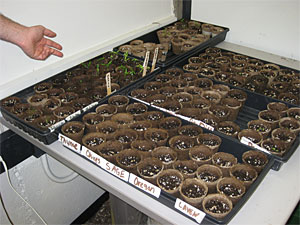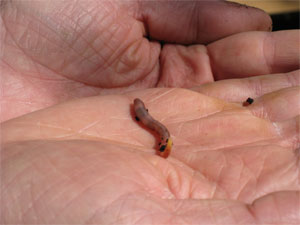This content was published: July 22, 2009. Phone numbers, email addresses, and other information may have changed.
Sylvania's learning gardens kick-start recycling efforts
Photos and Story by James Hill
Josh Liebschutz says he’s never gardened before – but by all accounts, he’s off to a promising start.
A chemistry instructor at the Sylvania Campus, Liebschutz took on the additional role of leading the campus’ environmental center in February. Since then he’s helped launch a variety of popular activities for students and faculty, one of which is the wildly successful organic gardening club.
“We have more than 100 students signed up in the club,” said Liebschutz, who established Fridays, from 10 a.m. to 6 p.m., as the club meeting and planting time, although that’s “very flexible – it gives us a centerpiece, but really, members work at the environmental center and in the garden when it’s convenient with their schedules.”
The idea for an organic gardening club was something that bubbled up to the surface through a process of elimination. Andrea Salyer came on board as Sylvania’s student body president this year and was interested in starting an on-campus, public community garden. When that fell through due to campus access and necessary onsite supervision, a new idea was born – an organic gardening club for the PCC community that Salyer could coordinate with guidance and support from Liebschutz, newly in charge of the environmental center and someone with a wealth of science knowledge, who could give pointers to student “master gardeners-in-the-making.”
Together, the duo has gathered seeds to give to club members for free; the seeds are bought with club funds or have been donated to the environmental center from staff. These heirloom variety seedlings – meaning not genetically modified – are first grown inside, in sprouting trays located in the environmental center, under full spectrum grow lights. Seedlings in the indoor phase include pepper, broccoli, watermelon, thyme, chives, sage, oregano, lavender, tomato and basil.
According to Liebschutz, it takes about two weeks for seedlings to sprout, at which time they’re transplanted outside to the organic gardening club’s plot, located toward the back of campus. No pesticides, herbicides or petrochemical fertilizers are used to spur their growth; rather, students take turns watering the plot, aerating the soil with a sifting machine, and weeding during the spring term and throughout the summer.
“It’s nice to see the teamwork and camaraderie that evolve from the group effort of caring for the garden,” said Liebschutz.
The organic garden is one of several gardening projects under way at the Sylvania Campus. The environmental center collects food scraps from the cafeteria twice weekly, which is deposited in two worm compost bins out back. Used coffee grounds from the cafeteria and the Juice It Up café on campus are used as natural feedstock to grow oyster mushrooms – which can be given back to the cafeteria for use in food preparation.
This mimics the larger loop recycling system at Rock Creek.
“We’re really looking to understand and complete that sustainable food loop in our practices at PCC, so that our students gain hands-on knowledge at the same time they’re having fun,” said Liebschutz.
Sylvania’s other “green” projects include the Learning Garden – a half-dozen plots that are owned by different departments and used to grow vegetables and flowers, while testing soil samples and assessing seed growth as part of their curriculum – and the Native Wildflower Garden, a year-round project focused on native plant identification, removal of weeds and invasive plant species like blackberries, and planting of indigenous species. A portion of the garden’s native species of flowers and wildlife are transplanted to other gardens on campus and nearby parks.
New this year are raised beds to grow perennial herbs, for use in the cafeteria, as well as a natural dye bed to produce organic vegetable dyes for the Art and Fashion students as well as those studying Horticultural Therapy as part of the Gerontology program.
“It’s important, both for the Sylvania Campus and PCC as a whole, to give our students tangible learning about sustainable, green practices, both inside the classroom or as part of outdoor activities like a gardening club,” said Linda Gerber, Sylvania Campus president. “I’m so proud of what Josh and Andrea have accomplished in such a short period of time – they’re living the green mission of PCC, and all of us benefit from that.”
Sylvania’s Environmental Center awarded grants
The Sylvania’s Environmental Center has won two awards. The first is a $1,200 grant from the Portland Bureau of Planning and Sustainability to build a new vermiculture bin made from recycled plastic lumber, to be built on campus late this summer. The Sylvania Vermiculture Project began in early 2008 with a Curriculum Development Grant; the project creates a functional environmental system that can be used by Josh Liebschutz’s ESR 172 class (and other classes) as a laboratory tool for inquiry-based learning experiments while simultaneously helping promote campus sustainability.
The second award is a $3,500 grant to the center for the 2009-2010 academic year from the Northwest Earth Institute, a nonprofit that creates and distributes environmentally-themed discussion groups. The award is part of a larger grant that it received from the Wal-Mart foundation, and it will cover the cost of having a students facilitate discussion groups of six to eight people each term through the year.
